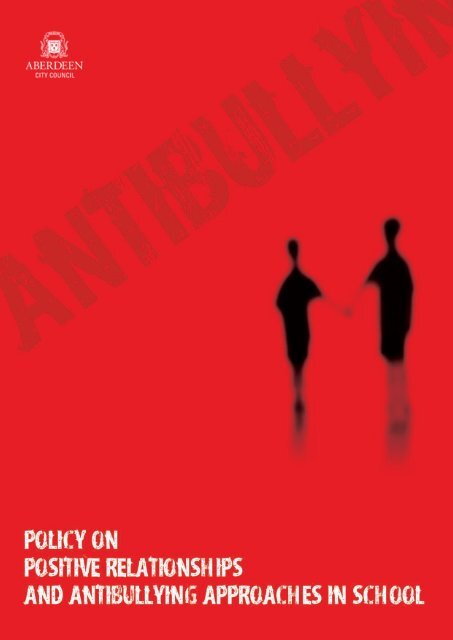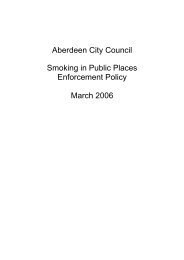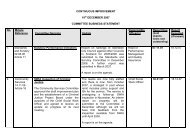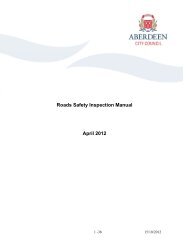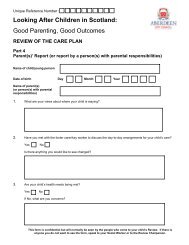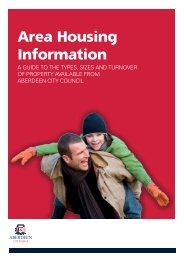Anti Bullying Policy - Aberdeen City Council
Anti Bullying Policy - Aberdeen City Council
Anti Bullying Policy - Aberdeen City Council
Create successful ePaper yourself
Turn your PDF publications into a flip-book with our unique Google optimized e-Paper software.
<strong>Aberdeen</strong> <strong>City</strong> <strong>Council</strong>, April 2009<br />
Thanks to the large number of staff and pupils in <strong>Aberdeen</strong> <strong>City</strong> who contributed to the development of this policy.<br />
Their enterprising approach to this work was assisted by Determined to Succeed (Enterprise in Education) funding.
Contents<br />
1<br />
2<br />
3<br />
4<br />
5<br />
6<br />
7<br />
8<br />
9<br />
10<br />
11<br />
12<br />
13<br />
14<br />
15<br />
16<br />
17<br />
positive relationships in schools<br />
the objectives of this policy<br />
what is bullying behaviour?<br />
types of bullying<br />
finding out the situation in your school<br />
why does bullying take place?<br />
developing positive relationships and preventing bullying<br />
responding to incidents of bullying<br />
developing and reviewing a school policy on positive relationships and antibullying approaches<br />
what <strong>Aberdeen</strong> <strong>City</strong> will do<br />
what pupils should do<br />
involving pupils<br />
what parents should do<br />
monitoring, recording and reporting bullying<br />
bullying of staff<br />
links to other policies<br />
materials and resources<br />
1<br />
1<br />
1<br />
2<br />
2<br />
2<br />
3<br />
3<br />
4<br />
5<br />
5<br />
5<br />
6<br />
6<br />
6<br />
7<br />
7<br />
Supporting information, which extends the information in this document, is available online on the <strong>Aberdeen</strong> Grid<br />
for Learning at www.aberdeeneducation.org.uk/enterprise/positiverelationships
positive relationships and<br />
antibullying approaches in schools<br />
1 positive relationships in schools<br />
Relationships in schools should be characterised by respect, kindness and consideration. In a school, all adults,<br />
children and young people have a responsibility to help each other to develop positive attitudes and behaviour, and to<br />
avoid using their power to bully or to prevent others from learning. Everyone has the right to feel valued and<br />
respected, and to develop selfesteem, a sense of belonging, and a feeling of being safe.<br />
Our responsibilities are set out in the United Nations Convention on the Rights of the Child.<br />
"Children have the right to be protected from being hurt and mistreated, physically or mentally.<br />
Governments should ensure that children are properly cared for and protect them from violence, abuse<br />
and neglect by their parents, or anyone else who looks after them.” (article 19)<br />
UNICEF are promoting Rights Respecting Schools which not only teach about children’s and human rights but also<br />
model rights and respect in all their relationships: adultspupils; pupils adults; pupilspupils .<br />
School staff play an important part in helping young people to develop mature and happy relationships, which is an<br />
important part of the curriculum and central to their present and future success in life. Schools are places where<br />
young people can learn and practice the skills of positive interpersonal relationships.<br />
Positive relationships among all members of the school community produce an environment that is conducive to all<br />
aspects of learning and without which learning can be greatly impeded.<br />
We do not tolerate bullying behaviour of any kind.<br />
2 the objectives of this policy<br />
●<br />
●<br />
●<br />
to increase the effectiveness of preventative practice<br />
to increase awareness of the causes and effects of bullying<br />
to offer guidance on dealing with bullying<br />
3 what is bullying behaviour?<br />
There is a difference between bullying and other hurtful behaviour and many disagreements do not constitute<br />
bullying behaviour. There are many definitions of bullying behaviour, but there are several important things to<br />
remember.<br />
●<br />
●<br />
it is hurtful it is repeated over a period of time<br />
it is difficult for those being bullied to stop it happening<br />
<strong>Bullying</strong> isn't always deliberate and people are sometimes not aware of the suffering they are causing.<br />
<strong>Bullying</strong> is not the same as falling out, although people may, of course, still need support when they do fall out with<br />
someone. It is also important to remember that individual incidents of hurtful behaviour still need to be dealt with.<br />
1
4 types of bullying<br />
<strong>Bullying</strong> can take many forms such as<br />
●<br />
●<br />
●<br />
●<br />
●<br />
verbal<br />
social<br />
physical<br />
emotional<br />
prejudicebased<br />
Supporting information is available online at<br />
www.aberdeeneducation.org.uk/enterprise/positiverelationships<br />
5 finding out the situation in your school<br />
If you wish to target action against bullying in your school, listening to pupils combined with a survey can help you to<br />
understand what is happening, and also give you some information about the impact of your strategy.<br />
Your survey is likely to have most impact if pupils are involved in the design and implementation of questionnaires,<br />
and in discussing and deciding what needs to be done as a result of the survey.<br />
Questionnaire design can be difficult. It will be most helpful if your questionnaires are designed in such a way that<br />
comparisons can be made from one year to the next. You are likely to want to analyse the results by class and year<br />
group and gender.<br />
Supporting information is available online at<br />
www.aberdeeneducation.org.uk/enterprise/positiverelationships<br />
6 why does bullying take place?<br />
Behaviour often communicates feelings, and it is important to try to understand the feelings that have led a person to<br />
bully others. Bullies often target people on whom they can displace their aggression, and one focus in dealing with<br />
the problem should be on what the bullies, through their behaviour, get out of being a bully.<br />
It may seem that the bullies are popular, but those who appear to be friends may do so out of fear rather than real<br />
friendship.<br />
The overt “reasons” for bullying include wearing glasses, being tall, short, fat, thin, being from a different race or<br />
culture or indeed possessing any characteristic<br />
that the bully can use as an “excuse” for the bullying. If the person does not possess any obvious difference, then<br />
the bully may well invent one. All these socalled reasons are irrelevant, and it is important not to blame the person<br />
being bullied for what is happening.<br />
Pupils who are bullied can be intelligent, popular, creative and caring with a strong sense of values. If a pupil is<br />
socially less popular than the rest of the group, then it is this pupil who is most likely to be bullied. If there is no such<br />
obvious target then the bully will pick on any pupil they think is unlikely to fight back.<br />
2
7 developing positive relationships and preventing bullying<br />
A school is a community in which everyone – parents/carers, pupils and staff have an interest in developing an<br />
atmosphere conducive to learning and personal development.<br />
If the wholeschool ethos is positive<br />
●<br />
●<br />
●<br />
●<br />
●<br />
●<br />
●<br />
●<br />
●<br />
●<br />
antibullying issues will be firmly embedded in the school’s behaviour policy.<br />
kindness and a respect for human dignity will pervade relationships in the school<br />
senior management will offer a clear lead and actively support pupils, staff and parents/carers<br />
a culture will exist in the school that bullying is unacceptable<br />
pupils will have regular opportunities for receiving information and having discussion about bullying issues, for<br />
example, within the Personal and Social Education (PSE) programme.<br />
staff, pupils and parents/carers will be involved in development of policies and action plans relating to positive<br />
relationships and antibullying<br />
positive relationships and antibullying statements will be prominently displayed and frequently promoted (eg<br />
through assemblies)<br />
helpline numbers (eg for ChildLine) will be prominently displayed<br />
there will be supervision of areas of the school where pupils feel vulnerable<br />
there will be a record keeping system to monitor the incidence of bullying in the school and to monitor the<br />
progress of dealing with individual incidents.<br />
Supporting information is available online at<br />
www.aberdeeneducation.org.uk/enterprise/positiverelationships<br />
8 responding to incidents of bullying<br />
While sanctions may be appropriate in some circumstances, it is vital that the school supports both bullies and those<br />
who have been bullied. To this end a school will<br />
●<br />
●<br />
●<br />
●<br />
recognise that everyone has a right not to be bullied and that bullying is always unacceptable<br />
try to ensure that incidents of bullying are always reported and are taken seriously<br />
encourage pupils to talk to an adult if bullying occurs and will have a variety of mechanisms to make this as<br />
easy as possible<br />
take every report of possible bullying seriously, no matter how small it may appear<br />
When an incident has been reported a school will<br />
●<br />
●<br />
●<br />
●<br />
●<br />
●<br />
●<br />
●<br />
●<br />
●<br />
●<br />
always take action<br />
attach no blame for the bullying, even by implication, to the pupil who has been bullied<br />
involve the pupil who has been bullied in considering what strategies might work, and give them a voice in<br />
decisions that are made about them<br />
enable the pupil who has been bullied to see that it is achievable for things to be better<br />
take care not to overreact, especially to rumours that may be unfounded<br />
inform parents about bullying incidents at an early stage and continue to support and inform them if bullying<br />
continues<br />
inform relevant staff about actions taken and keep them up to date with progress<br />
keep a record of incidents and action taken, and complete any appropriate form (eg the reporting of racist<br />
incidents)<br />
involve other agencies where appropriate<br />
monitor the results of its actions after dealing with incidents<br />
attempt to help bullies to understand why their behaviour is unacceptable and to understand the consequences<br />
for them and for those they bully.<br />
3
Pupils are sometimes afraid that things may become worse for them is they talk to an adult about bullying,<br />
particularly if the bully suspects this has happened. It is particularly important for adults to be aware of this possible<br />
fear and to take it into account in what they do to help.<br />
There are many strategies available for dealing with bullying. Each incident of bullying is different, and there is no<br />
particular strategy that will work in every case.<br />
The first decision that has to be made in each instance is to try to identify which strategy or combination of strategies<br />
is most likely to work. It is likely that multiple strategies will be needed for those pupils who persistently and<br />
seriously bully others.<br />
Some incidents can be dealt with easily, and a few words from the teacher will make young people aware of what<br />
they are doing and how it is causing distress to the other person.<br />
However, other incidents of bullying are extremely difficult to deal with and it may seem as though there is no<br />
solution. Talking to a teacher or another adult is often a first important step, but there are no magic solutions.<br />
Dealing effectively with bullying involves selfreflection, willingness and patience.<br />
9 developing and reviewing a school policy on positive relationships and antibullying approaches<br />
Each school will have its own antibullying policy that should be drawn up, as far as possible, through involvement of<br />
staff, pupils and parents, and will be regularly reviewed. The policy should include<br />
●<br />
●<br />
●<br />
●<br />
●<br />
●<br />
●<br />
●<br />
●<br />
how this (<strong>Aberdeen</strong> <strong>City</strong>) policy will be implemented in the school<br />
a clear and consistent approach to dealing with bullying, taking account the issues in section 8 (above)<br />
what staff should do and whom they should contact when they notice possible bullying<br />
the specific roles of all members of the school community in dealing with bullying including<br />
pupils<br />
parents<br />
senior management team<br />
class/subject teachers<br />
personal support staff (eg Guidance staff, behaviour support staff, school nurse)<br />
nonteaching staff (eg administrative staff, catering staff, support staff, community liaison officer etc)<br />
the local support available to bullies and those being bullied<br />
the sanctions available and the circumstances in which they will be applied<br />
how the school will raise and maintain awareness of issues relating to bullying among all staff, pupils and<br />
parents<br />
how the policy will be communicated to pupils and parents<br />
how the policy will be maintained and reviewed.<br />
The contents or changes to the school policy should be communicated to parents every time it is reviewed. This may<br />
be done in the form of a leaflet or newsletter written specifically for parents. The policy document should be freely<br />
available (eg on the school’s website).<br />
4
10 what <strong>Aberdeen</strong> <strong>City</strong> will do<br />
<strong>Aberdeen</strong> <strong>City</strong> <strong>Council</strong> will<br />
●<br />
●<br />
●<br />
●<br />
●<br />
●<br />
●<br />
●<br />
be proactive in raising the awareness of staff in schools by ensuring that relevant information is communicated<br />
to schools<br />
provide continuing professional development (CPD) for staff about bullying issues and methods of dealing with<br />
bullying<br />
offer help to schools as they consider possible solutions to incidents of bullying (with the support of Education<br />
Officers)<br />
involve pupils through the <strong>Aberdeen</strong> Student Forum and pupil councils in schools in the discussion of positive<br />
relationships, bullying issues and antibullying strategies<br />
organise pupil seminars and conferences on antibullying from time to time<br />
consider the possibility of offering courses for pupils, for example to rehabilitate those excluded from school for<br />
bullying<br />
offer information about bullying through its websites (schools will remind parents of this at intervals through<br />
their newsletters)<br />
inform schools when the information on a city council website has been updated<br />
11 what pupils should do<br />
<strong>Bullying</strong> is unacceptable and should never be ignored. Everyone in a school has a part to play in preventing and<br />
dealing with bullying.<br />
Schools should encourage and support pupils to talk to an adult if they are being bullied, or if they know bullying is<br />
happening. If someone is hurting them or another person or causing them to worry, they should be encouraged to<br />
know that there are people who can help them and whom they can trust and feel comfortable with.<br />
It is important that pupils know that there are people who are able to help, so that they can have the confidence to<br />
talk to an adult. Pupils who have been bullied may need help so that they don’t feel ashamed nor that it is their fault.<br />
If the bullying does not stop they should be encouraged to speak to an adult again.<br />
It may be appropriate in some cases to encourage pupils to keep a keep log of incidents.<br />
If a pupil feels they are being bullied through a social networking site because of nasty comments, rumours, the<br />
display of embarrassing photos or in other ways they should<br />
●<br />
●<br />
●<br />
●<br />
●<br />
not respond<br />
block the bully’s messages<br />
print any evidence<br />
inform an adult<br />
inform the school<br />
5
12 involving pupils<br />
Children and young people have lots of ideas about how bullying should be prevented and how it should be dealt<br />
with. Pupil councils or young people’s groups in schools can be extremely helpful both in gathering information about<br />
the extent of bullying and in suggesting and helping to implement strategies.<br />
Schools should involve young people in<br />
●<br />
●<br />
●<br />
●<br />
collecting information through surveys and questionnaires<br />
contributing to the discussion of bullying issues in school<br />
suggesting practical ways of dealing with bullying<br />
peer support programmes that help in developing positive relationships and in dealing with bullying<br />
13 what parents should do<br />
Parents have a responsibility for ensuring that their sons and daughters receive appropriate education, which should<br />
include educating them about bullying.<br />
Parents should inform the school at the earliest possible stage, even if it is just a “be aware” call to alert the school<br />
to possible bullying.<br />
Parents should work closely with the school in dealing with bullying. It is important to understand that there are no<br />
magic solutions and that dealing with bullying involves a willingness to work patiently in partnership with the school.<br />
Parents should cooperate with mediation meetings of pupils, parents and staff, where this is appropriate.<br />
14 monitoring, recording and reporting bullying<br />
Schools will involve staff, pupils and parents/carers in developing policy and strategies. They may also find it helpful<br />
to conduct a survey of bullying incidents, pupil attitudes and their understanding of what they should do if they are<br />
aware of bullying.<br />
However, the interpretation of statistical data on the frequency of incidents should be done with care as such data<br />
often reflects awareness of the issues rather than the actual extent of the problem. It is well known, for example<br />
that reported incidents tend to rise when bullying issues are given a higher profile, but this does not necessarily<br />
mean that the actual number of incidents has increased.<br />
However, it is important that schools keep a record of bullying incidents to enable them to maintain effectiveness in<br />
dealing with such incidents.<br />
15 bullying of staff<br />
Staff are sometimes bullied by other staff or by pupils. Such incidents should be treated just as seriously as bullying<br />
among pupils. The headteacher should be notified immediately.<br />
For example, teachers in some places have reported bullying by pupils who use mobile phones to film them losing<br />
their temper and then send the videos to their friends. It has also been reported that sometimes pupils goad staff<br />
into losing their temper in front of the camera to make the video more entertaining.<br />
Pupils in some parts of the country have sometimes posted abuse and offensive video clips of teachers online.<br />
YouTube has examples from several countries of teachers being held up to ridicule. There are also other sites on<br />
which comments can be made about teachers.<br />
6
16 links to other policies<br />
<strong>Aberdeen</strong> city has a number of related policies and guidelines, such as<br />
● Child Protection Guidelines (North East Scotland Child Protection Committee)<br />
● <strong>Policy</strong> on Behaviour of Staff Towards Children and Young People (<strong>Aberdeen</strong> <strong>City</strong> <strong>Council</strong>, 2007)<br />
● Internet & Communications Technology Safety (<strong>Aberdeen</strong> <strong>City</strong> <strong>Council</strong>)<br />
● <strong>Anti</strong>racist <strong>Policy</strong> (<strong>Aberdeen</strong> <strong>City</strong> <strong>Council</strong>)<br />
17 materials and resources<br />
Information about materials, resources and organisations involved in antibullying work is available online at<br />
www.aberdeeneducation.org.uk/enterprise/positiverelationships<br />
7


